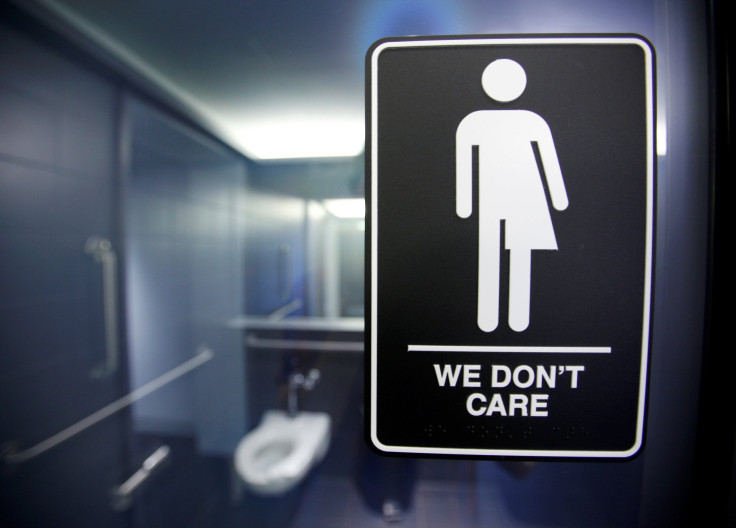Transgender Student Bathroom Debate: Will Obama Administration Take Away Federal Funding From Schools?

Attention, educators: If your school has transgender students, you have to let them use whichever restroom aligns with their gender identity. And if you don't, you could get into serious trouble.
That's the message the U.S. Department of Education sent to schools across the country Friday when it issued guidance in the form of a Dear Colleague letter. In a historic move, the White House explicitly said that gender identity is protected under Title IX of the Education Amendments of 1972, a law that prohibits discrimination based on sex. Schools have to comply with Title IX in order to receive federal funding from the department, which this year requested $69.4 billion to use to support the national education system.
“Our federal civil rights law guarantees all students, including transgender students, the opportunity to participate equally in school programs and activities without sex discrimination as a core civil right,” the department's assistant secretary for civil rights, Catherine E. Lhamon, said in a news release. “This guidance answers questions schools have been asking, with a goal to ensure that all students are treated equally consistent with their gender identity."
Title IX forbids education programs that receive federal assistance from discriminating based on sex in areas like admissions, athletics, harassment and discipline, according to the department's website. The Education Department declared in its letter that it treats gender identity as sex for Title IX purposes, writing: "This means that a school must not treat a transgender student differently from the way it treats other students of the same gender identity."
The letter "does not have the force of law, but it contains an implicit threat," the New York Times wrote Thursday while breaking the news. Essentially, if schools don't comply, they could find themselves in a situation where they're sued by the government or lose federal funding.
LGBT advocates celebrated the announcement and the White House's intervention in the transgender student debate playing out in states like North Carolina. But whether the Obama administration's threat is real — that it would actually take action and pull billions of dollars from schools — remains to be seen.
Here are six factors to consider when evaluating the potential impact of the Education Department's Friday letter:
1. The Huffington Post noted this month that the federal agency has never revoked all of a school's funding because of Title IX. When a college or university is found to be in violation of Title IX for mishandling sexual assault cases, for example, the Education Department typically brokers a resolution agreement in which the institution improves its policies — not loses all its money. The process of taking away federal funds is also a complicated, lengthy one.
2. White House press secretary Josh Earnest told reporters Thursday the president was waiting for the issue to be settled legally before delving into financial consequences.
“The administration will not take action to withhold funding while this enforcement process is playing out in the courts,” Earnest said, making reference to the various lawsuits filed over North Carolina's HB 2, part of which forces transgender people to use restrooms based on biological sex.
3. That doesn't mean the department won't ever do it, said Barmak Nassirian, director of federal relations and policy analysis for the American Association of State Colleges and Universities in Washington, D.C. The Washington Post reported that in the 1960s, the government refused to fund dozens of segregated school districts.
In relation to Title IX, the Education Department "is not prone to making completely empty threats," Nassirian said. He added that taking away funding is such "a serious threat that no one today has actually ignored it."
4. In any event, it would decimate schools. In North Carolina, for example, more than $4 billion in aid is on the line, according to NBC News. "At this point, there is not a state — and certainly isn't an institution of higher education — currently receiving federal funding that could realistically walk away from it," Nassirian added.
University of North Carolina President Margaret Spellings, a former Department of Education secretary, admitted as much earlier this week. "We can't operate this place without federal funding," she told reporters.
5. The people leading the movement to restrict restrooms by sex aren't happy with what they see as President Barack Obama's reinterpretation of the law. Take the case of Port Neches-Groves, Texas, Superintendent Rodney Canvass, who told 12News the department's letter "is going straight to the paper shredder" because it failed to protect young girls' privacy and safety.
#BREAKING @danpatrick tells #Texas superintendents: "Do not enact @POTUS policy on transgender bathrooms." @CBSDFW pic.twitter.com/cIdhy7DnYA
— Jack Fink (@cbs11jack) May 13, 2016
That likely means more legal action, said Suzanne Eckes, an education law and policy professor at Indiana University in Bloomington. But lawsuits can represent another financial risk. "I think principals could say, 'We've got guidance from the Obama administration, and that's a real threat from what they're saying in the media; and in addition, we could end up in litigation,'" she said. "'Do you really want to lose our federal funding over where a student urinates? Is that really where we want to spend our time and money?'"
6. What can't get lost in all of this is the fact that the U.S. will soon have a new president. If the new commander-in-chief leans conservative, transgender students' rights could be rolled back. Donald Trump, for one, has waffled on the issue, coming out against HB 2 in April but arguing for states' rights Friday morning.
In any case, the debate is far from over, according to Eckes. "I think it's going to absolutely blow up until we see more litigation on this issue," she said.
© Copyright IBTimes 2024. All rights reserved.






















